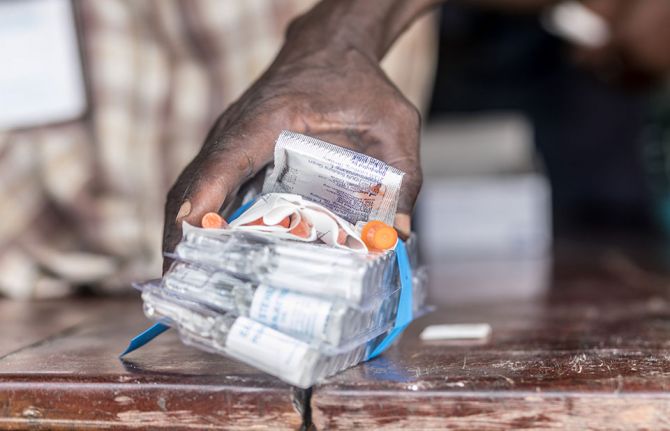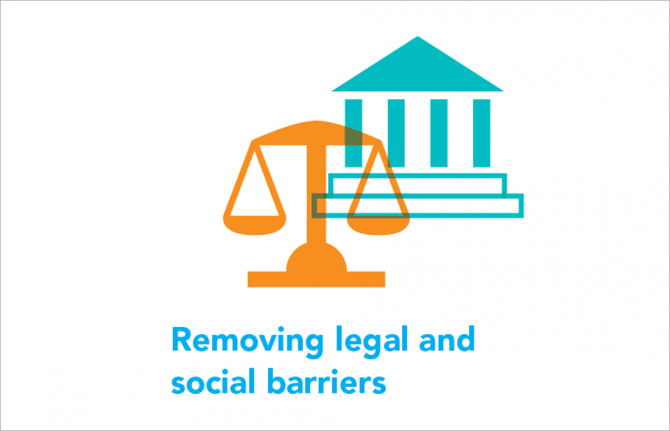
Press Release
Groundbreaking trial results confirm HIV treatment prevents transmission of HIV
12 May 2011 12 May 2011WHO and UNAIDS hail results from the HPTN 052 trial that show antiretroviral therapy to be 96% effective in reducing HIV transmission in couples where one partner has HIV
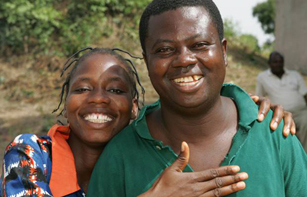
Credit: UNAIDS/P.Virot.
GENEVA, 12 May 2011—Results announced today by the United States National Institutes of Health show that if an HIV-positive person adheres to an effective antiretroviral therapy regimen, the risk of transmitting the virus to their uninfected sexual partner can be reduced by 96%.
“This breakthrough is a serious game changer and will drive the prevention revolution forward. It makes HIV treatment a new priority prevention option,” said Michel Sidibé, Executive Director of the Joint United Nations Programme on HIV/AIDS (UNAIDS). “Now we need to make sure that couples have the option to choose Treatment for Prevention and have access to it.”
The trial, conducted by the HIV Prevention Trials Network, enrolled more than 1 700 sero-discordant couples (one partner who is HIV-positive and one who is HIV-negative) from Africa, Asia, Latin America and the United States of America.
Only people living with HIV with a CD4 cell count of between 350 and 550, thus not yet eligible for treatment for their own health according to latest WHO guidelines, were enrolled in the study. The reduction of sexual transmission of HIV was so significant that the trial was stopped 3-4 years ahead of schedule.
"This is a crucial development, because we know that sexual transmission accounts for about 80% of all new infections," said Dr Margaret Chan, WHO Director-General. "The findings from this study will further strengthen and support the new guidance that WHO is releasing in July to help people living with HIV protect their partners."
The availability of Treatment for Prevention will not only empower people to get tested for HIV, but also to disclose their HIV status, discuss HIV prevention options with their partners and access essential HIV services. It will also significantly contribute to reducing the stigma and discrimination surrounding HIV.
“People living with HIV can now, with dignity and confidence, take additional steps to protect their loved ones from HIV,” said Mr Sidibé.
It is currently estimated that only about half of the 33 million people living with HIV know their HIV status. An increase in the uptake of testing for HIV would have a significant impact on the AIDS response, particularly if more people gain access to treatment in light of the new findings.
UNAIDS and WHO recommend that couples make evidence-informed decisions on which combination of HIV prevention options is best for them. UNAIDS urges that Treatment for Prevention be one of the options made available to couples. The new WHO guidelines coming out in July will help countries to make this a reality for people who choose to use this new HIV prevention option. The guidelines will include specific recommendations on increasing access to HIV testing and counseling and the use of antiretroviral therapy among discordant couples.
No single method is fully protective against HIV. Treatment for Prevention needs to be used in combination with other HIV prevention options. These include correct and consistent use of male and female condoms, waiting longer before having sex for the first time, having fewer partners, male circumcision, and avoiding penetrative sex. The significance of the findings put Treatment for Prevention firmly in the HIV prevention package.
To increase access to the Treatment for Prevention option, the Treatment 2.0 initiative must be urgently implemented to innovate, simplify, reduce costs and mobilize communities to scale up HIV testing and counseling and treatment.
UNAIDS will convene a partners meeting to further discuss this new development and its implications for the AIDS response. This builds on a series of expert consultations which have been convened by UNAIDS and WHO on Treatment for Prevention during the last two years.
UNAIDS and WHO will work with countries and partners to make Treatment for Prevention an integral part of the HIV response and to ensure it is made available to people who wish to use it as soon as possible.
Contact
UNAIDS GenevaSophie Barton-Knott
tel. +41 22 791 1697
bartonknotts@unaids.org
WHO Geneva
Tunga Namjilsuren
tel. +41 22 791 1073
namjilsurent@who.int
Press centre
Download the printable version (PDF)

Press Release
Archbishop Tutu passes baton to a new generation of leaders in the AIDS response
04 May 2011 04 May 2011Commitments made to transform the response to HIV at historic event on Robben Island

From left: Archbishop Desmond Tutu; Michel Sidibé, UNAIDS Executive Director; Dr Aaron Motsoaledi, South Africa Minister of Health.
Credit: UNAIDS/AFP Photo G. Guercia
Robben Island/Geneva, 4 May 2011—Archbishop Desmond Tutu has symbolically passed the baton to a new generation of young leaders focused on AIDS. The handover took place during an event held to inspire a transformation of the AIDS response which was convened by the Joint United Nations Programme on HIV/AIDS (UNAIDS) on Robben Island in South Africa.
The event joined together world renowned leaders from the UNAIDS High Level Commission on HIV Prevention with a group of young leaders who, in turn, presented the commissioners with a ‘call to action’ articulating the vision of the youth movement on HIV. The Commission on HIV Prevention was established by UNAIDS in 2010 to influence and lead social and political action aimed at galvanizing support for effective HIV prevention programmes.
“Today is about putting our heads and our hearts together to support a renewal of leadership and commitment in HIV prevention,” said Archbishop Tutu, co-chair of the Commission on HIV and long-standing AIDS advocate. “Bold and honest actions are needed and we look to the next generation of leaders to bring about positive change in attitudes and actions.”
The youth representatives convened recently in Mali at a youth leader’s summit on HIV where young people from across the world worked to find innovative ways of strengthening the links between youth and AIDS movements, notably through new media channels.
“Young people have the power to change the future and transform the AIDS response,” said Michel Sidibé, Executive Director of UNAIDS. “A collective youth movement mobilised around HIV prevention which exchanges important information through new technologies and peer education will stop new infections.”
Archbishop Tutu called on the young participants to commit to taking forward a new generation of leadership in the AIDS response. He also called on the HIV Prevention Commission members to inspire and mentor them in their leadership role.
Commitments were also made by the Commissioners who pledged to take the transformation of the AIDS response forward in their respective sectors. Commissioner Earvin “Magic” Johnson announced by video message that his Foundation will be a founding partner of a global foundations fellowship programme for young people. Elena Pinchuk’s AntiAIDS Foundation announced a global competition for young innovators to develop social networking campaigns. The Global centre for innovation in mobile health and Cell Life pledged to work together with UNAIDS and mobile service providers to promote HIV prevention and behaviour change dialogue through the use of mobile phones in at least five countries.
The event was held on Robben Island off the coast of Cape Town in South Africa where former president Nelson Mandela was incarcerated. The location is seen as a testimony to the human spirit, symbolising the power of change.
Contact
UNAIDS JohannesburgBathsheba Okwenje
tel. +27 82 909 2638
okwenjeb@unaids.org
UNAIDS Geneva
Sophie Barton-Knott
tel. +41 22 791 1697
bartonknotts@unaids.org
Press centre
Download the printable version (PDF)

Press Release
UN Secretary-General outlines new recommendations to reach 2015 goals for AIDS response
31 March 2011 31 March 2011In lead-up to June High Level Meeting, progress report presents overview of efforts needed to help countries achieve universal access to HIV services and zero new HIV infections, discrimination and AIDS-related deaths
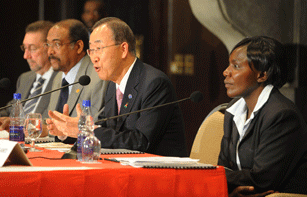
Launch of the Report of the Secretary-General. Nairobi, Kenya, 31 March 2011.
Credit: UNAIDS/AFP - S.Maina
NAIROBI, 31 March 2011—Thirty years into the AIDS epidemic, investments in the AIDS response are yielding results, according to a new report released today by United Nations Secretary-General Ban Ki-moon. Titled Uniting for universal access: towards zero new HIV infections, zero discrimination and zero AIDS-related deaths, the report highlights that the global rate of new HIV infections is declining, treatment access is expanding and the world has made significant strides in reducing HIV transmission from mother to child.
Between 2001 and 2009, the rate of new HIV infections in 33 countries—including 22 in sub-Saharan Africa—fell by at least 25%. By the end of 2010, more than 6 million people were on antiretroviral treatment in low- and middle-income countries. And for the first time, in 2009, global coverage of services to prevent mother-to-child transmission of HIV exceeded 50%.
But despite the recent achievements, the report underscores that the gains are fragile. For every person who starts antiretroviral treatment, two people become newly infected with HIV. Every day 7 000 people are newly infected, including 1 000 children. Weak national infrastructures, financing shortfalls and discrimination against vulnerable populations are among the factors that continue to impede access to HIV prevention, treatment, care and support services.
The Secretary-General’s report, based on data submitted by 182 countries, provides five key recommendations that will be reviewed by global leaders at a UN General Assembly High Level Meeting on AIDS, 8–10 June 2011.
“World leaders have a unique opportunity at this critical moment to evaluate achievements and gaps in the global AIDS response,” said Secretary-General Ban Ki-moon at the press briefing in the Kenyan capital. “We must take bold decisions that will dramatically transform the AIDS response and help us move towards an HIV-free generation.”
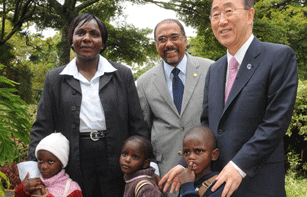
United Nations Secretary-General Ban Ki-moon and UNAIDS Executive Director Michel Sidibé with Rebecca Auma Awiti, mother of three children and field coordinator with the non-governmental organization Women Fighting AIDS in Kenya who told her story at the press conference.
Credit: UNAIDS/AFP - S.Maina
“Thirty years into the epidemic, it is imperative for us to re-energise the response today for success in the years ahead,” said UNAIDS Executive Director Michel Sidibé, who joined Mr Ban for the launch of the report. “Gains in HIV prevention and antiretroviral treatment are significant, but we need to do more to stop people from becoming infected—an HIV prevention revolution is needed now more than ever.”
Rebecca Auma Awiti, a mother living with HIV and field coordinator with the non-governmental organization Women Fighting AIDS in Kenya told her story at the press conference. “Thanks to the universal access movement, my three children were born HIV-free and I am able to see them grow up because of treatment access,” she said.
Mobilizing for impact
In the report there are five recommendations made by the UN Secretary-General to strengthen the AIDS response:
- Harness the energy of young people for an HIV prevention revolution;
- Revitalize the push towards achieving universal access to HIV prevention, treatment, care and support by 2015;
- Work with countries to make HIV programmes more cost effective, efficient and sustainable;
- Promote the health, human rights and dignity of women and girls; and
- Ensure mutual accountability in the AIDS response to translate commitments into action.
The Secretary-General calls upon all stakeholders to support the recommendations in the report and use them to work towards realizing six global targets:
- Reduce by 50% the sexual transmission of HIV—including among key populations, such as young people, men who have sex with men, in the context of sex work; and prevent all new HIV infections as a result of injecting drug use;
- Eliminate HIV transmission from mother to child;
- Reduce by 50% tuberculosis deaths in people living with HIV;
- Ensure HIV treatment for 13 million people;
- Reduce by 50% the number of countries with HIV-related restrictions on entry, stay and residence; and
- Ensure equal access to education for children orphaned and made vulnerable by AIDS.
As international funding for HIV assistance declined for the first time in 2009, the report encourages countries to prioritize funding for HIV programmes, including low- and middle-income countries that have the ability to cover their own HIV-related costs. It also stresses the importance of shared responsibility and accountability to ensure the AIDS response has sufficient resources for the coming years.
The report and more information about the High Level Meeting on AIDS can be found online at: unaids.org/en/aboutunaids/unitednationsdeclarationsandgoals/2011highlevelmeetingonaids/
Contact
UNAIDS GenevaSophie Barton-Knott
tel. +41 22 791 1697
bartonknotts@unaids.org
UNAIDS Nairobi
Saira Stewart
tel. +41 79 467 2013
stewarts@unaids.org
UNAIDS Nairobi
Esther Gathiri-Kimotho
tel. +254 20 762 6718
gathirikimothoe@unaids.org
UN Department of Public Information New York
Vikram Sura
tel. +1 212 963 8274
sura@un.org
UN Department of Public Information New York
Pragati Pascale
tel. +1 212 963 6870
pascale@un.org
External links
External links
Press centre
Download the printable version (PDF)

Press Release
President Kagame fully engaged in UN General Assembly High Level Meeting on AIDS
24 March 2011 24 March 2011Rwandan President will work with fellow leaders to shape the future of the AIDS and development agenda
Geneva, 24 March 2011—In partnership with UNAIDS, the President of Rwanda, Paul Kagame will lead a Heads of State event on HIV and broader development issues at the United Nations General Assembly High Level meeting on AIDS in June.
"Extraordinary efforts are needed to achieve results in global health and development, in order to transform the lives of our citizens,” said President Kagame. “As leaders, we will need to be innovative in our approach to these defining issues of our time."
The announcement came following a meeting with the Executive Director of UNAIDS, Michel Sidibé who was on an official visit to Rwanda to further collaboration in the response to HIV.
“President Kagame is a visionary and a highly respected world leader,” said Mr Sidibé. “He has been pivotal in turning Rwanda’s AIDS epidemic around. The experience and leadership he will bring to the High Level Meeting discussions in June will be instrumental in bringing AIDS out of isolation and greater country ownership.”
Since President Kagame took up leadership in 2000, HIV prevalence has almost halved and the number of people newly infected with HIV reduced by around 25%.
The Heads of State session will focus on areas such as integrating HIV into broader health and development issues and shared responsibility in responding to the epidemic. Major announcements will include a Pan-African vision for country ownership.
The special event will take place during the High Level Meeting on AIDS from 8-10 June 2011 where leaders will gather to shape the future of AIDS, health and development.
Press centre
Download the printable version (PDF)

Feature Story
Celebrated artist and activist Annie Lennox appointed as International UNAIDS Goodwill Ambassador
02 June 2010
02 June 2010 02 June 2010 (from right) Annie Lennox, new UNAIDS Goodwill Ambassador, and Michel Sidibé, UNAIDS Executive Director Credit: UNAIDS/B. Hamilton
(from right) Annie Lennox, new UNAIDS Goodwill Ambassador, and Michel Sidibé, UNAIDS Executive Director Credit: UNAIDS/B. HamiltonGeneva, 2 June 2010 – The world renowned Scottish singer songwriter and women’s activist Annie Lennox has been named as International Goodwill Ambassador for the Joint United Nations Programme on HIV/AIDS (UNAIDS). With an award winning career spanning several decades, Ms. Lennox is one of the world’s most outstanding musical voices. Now, she renews her commitment to speak out for women and girls affected by the HIV epidemic.
We must address the rights of women and girls and challenge their second class citizen status, which puts them at greater risk of HIV.
Ms Annie Lennox, UNAIDS Goodwill Ambassador
“The daily brutality faced by millions of women and girls is unacceptable,” said Ms Lennox. “If we are to end the cycle of human devastation triggered by the AIDS epidemic, we must address the rights of women and girls and challenge their second class citizen status, which puts them at greater risk of HIV.” Ms Lennox is a dedicated activist and campaigner working for social justice with numerous organisations. In October 2007, she launched her own “SING” campaign, working to raise awareness and support for women and children affected by the AIDS pandemic in Southern Africa.
She has previously supported UNAIDS, participating in the launch of a five-year action plan aimed at ending gender inequalities and human rights violations.
“How can anyone not be moved by Annie Lennox and her voice? I am sure with her incredible passion and presence, she will raise awareness of the terrible toll HIV has taken on women and girls,” said UNAIDS Executive Director Michel Sidibé, “With her amazing energy, she will make sure international, national and community leaders challenge the injustice of gender inequality.”
I am sure with her incredible passion and presence, she will raise awareness of the terrible toll HIV has taken on women and girls.
Mr Michel Sidibé, UNAIDS Executive Director
The lack of access to quality sexual and reproductive health services contributes to the high number of deaths among women of the reproductive age.
In her new role as International UNAIDS Goodwill Ambassador, Ms Lennox will be in Washington D.C. with Mr Sidibé, from the 7-9 of June to participate in the Women Deliver 2010 conference and 2010 Global Business Coalition conference. She will use these events to advocate for a global movement to focus on the HIV-specific needs of women and girls as well as to empower women and girls so that they can better protect themselves from HIV.
Celebrated artist and activist Annie Lennox appoi
Press centre:
Download printable version (pdf, 20 Kb.)
Contact:
UNAIDS: Saya Oka
Tel. +41 22 791 1697
E-mail: okas@unaids.org
UNAIDS: Tina Bille
Tel. +41 22 791 4928
E-mail: billet@unaids.org

Feature Story
UN Secretary-General urges countries to follow the United States and lift travel restrictions for people living with HIV
31 October 2009
31 October 2009 31 October 2009Geneva/New York, 31 October 2009 — UNAIDS welcomes President Obama’s announcement of the final rule removing entry restrictions based on HIV status from US policy. The removal of HIV-related travel restrictions in the US overturns a policy that had been in place since 1987. Such restrictions, strongly opposed by UNAIDS, are discriminatory and do not protect public health.
“I congratulate President Obama on announcing the removal of the travel restrictions for people living with HIV from entering the United States,” said United Nations Secretary-General Ban Ki-moon. “I urge all other countries with such restrictions to take steps to remove them at the earliest.”
The United Nations Secretary-General has made the removal of stigma and discrimination faced by people living with HIV a personal issue. He called for the removal of travel restrictions for the first time in his address to the General Assembly during the High Level Meeting on AIDS in 2008. “That they should be discriminated against, including through restrictions on their ability to travel between countries, should fill us all with shame,” said Secretary-General Ban in a speech to the Global AIDS Conference in August last year.
At his request, several countries including his home country, the Republic of Korea, are in the last stages of removing travel restrictions. Other countries that are considering removal of travel restrictions include China and Ukraine. In 2008, the UNAIDS board strongly encouraged all countries to eliminate HIV-specific restrictions on entry, stay and residence and ensure that people living with HIV are no longer excluded, detained or deported on the basis of HIV status.
“Placing travel restrictions on people living with HIV has no public health justification. It is also a violation of human rights,” said Michel Sidibé, Executive Director of UNAIDS. “We hope that other countries that still have travel restrictions will remove them at the earliest.”
Nearly 59 countries impose some form of travel restrictions on people living with HIV. The International Guidelines on HIV/AIDS and Human Rights state that any restriction on liberty of movement or choice of residence based on suspected or real HIV status alone, including HIV screening of international travellers, is discriminatory. Travel restrictions do not have an economic justification either. People living with HIV can now lead long and productive working lives, a fact that modifies the economic argument underlying blanket restrictions; concern about migrants’ drain on health resources must be weighed with their potential contribution.
UN Secretary-General urges countries to follow th
Press centre:
Related

Press Release
UNAIDS Executive Director met Caribbean delegations
21 May 2009 21 May 2009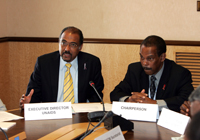
UNAIDS Executive Director Michel Sidibé (left) with Dr Edward Greene, Assistant-Secretary General, CARICOM Secretariat. 20 May 2009 Geneva. Credit: UNAIDS/P. Virot
UNAIDS Executive Director Mr Michel Sidibé met on Wednesday 20th May with a delegation of the Caribbean community (CARICOM) at the 62nd World Health Assembly to discuss the Caribbean priorities for collaboration with UNAIDS.
Dr Edward Greene, Assistant-Secretary General of the CARICOM Secretariat and Mr Karl Hood, Minister of Health of Grenada and Chair of the Council of Human and Social Development of CARICOM, opened the meeting acknowledging Mr Sidibé’s leadership in accelerating the global response to HIV as well as the vital role played by UNAIDS in setting up and fostering growth of the Pan Caribbean Partnership against HIV (PANCAP).
In October 2008, during CARICOM’s 7th general assembly, participants approved the Caribbean Regional Strategic Framework for 2008-2013 which focuses on actions that will enable countries to achieve universal access to HIV prevention, treatment, care and support by 2010.
Participants at the meeting made a call to UNAIDS to institutionalize and further strengthen the support it provides in the region. They called for UNAIDS to focus country assistance upon fully implementing the agreed regional Strategic Framework.
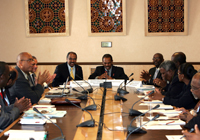
Participants during the UNAIDS - CARICOM delegations meeting that took place on the sideline of the 62nd World Health Assembly. 20 May 2009 Geneva. Credit: UNAIDS/P. Virot
In response, Mr Sidibé reaffirmed UNAIDS’ commitment to provide its experience and technical support to help improve PANCAP’s capabilities to support its work at the international, country and community levels.
Mr Sidibé noted to participants that he recognised the need for strengthened technical support in the region. To this end he highlighted the importance of establishing a Technical Support Facility in the region.
During his intervention, Mr Sidibé highlighted the need to bring together all United Nations organizations working in the region under one action results framework. He also proposed the creation of an advisory group with representatives of CARICOM that could advise the UNAIDS Regional Director in identifying and coordinating priorities for an effective response to the epidemic in the region.
All participants agreed that the CARICOM – UNAIDS collaboration is producing positive results in the response to AIDS and reiterated their commitment to further strengthen the partnership.
Right Hand Content
Feature stories:
Migrant workers and HIV vulnerability in South Asian and South East Asian countries (18 May 2009)
Sixty-second World Health Assembly to be dominated by A(H1N1) (18 May 2009)
UN Cares: UN system workplace programme on HIV launched in Asia Pacific (2 December 2008)
UN Secretary-General opens UNPlus exhibition (1 December 2007)
UN Plus meets UN Secretary General (22 May 2007)
Multimedia:
External links:

Press Release
UNAIDS urges greater protection for the most vulnerable in the Central African Republic
19 February 2014 19 February 2014Under-Secretary-General of the United Nations and UNAIDS Executive Director Michel Sidibé on joint humanitarian mission warns of a growing health crisis
GENEVA/BANGUI, 19 February 2014—The political and military crisis in the Central African Republic is obstructing humanitarian efforts and endangering the already limited access citizens have to essential health services.
UNAIDS Executive Director Michel Sidibé is conducting a joint mission with Under-Secretary-General of the United Nations and Emergency Relief Coordinator Valerie Amos, the African Union Commissioner for Political Affairs Aicha Abdullahi and the Assistant Secretary-General of the UN Department of Safety and Security, Mbaranga Gasarabwe from 18-20 February to the Central African Republic.
Mr Sidibé, Ms Amos, Dr Abdullahi and Ms Gasarabwe met with the country’s President of the Transitional Government, Catherine Samba-Panza who expressed her appreciation to the United Nations for its efforts in bringing humanitarian aid to people in need. However the President said more humanitarian action is desperately needed as many people are hungry. She said reconciliation was essential and that so far the root causes of the crisis had not been tackled.
The President’s words of reconciliation were echoed by Christian and Muslim leaders who met with the delegation as well.
The United Nations has called for US$ 551 million to meet humanitarian needs—of which 13% has been raised. Global solidarity is crucial to ensure funding is made available for the two and a half million people reportedly in need of assistance.
“There is no longer a fine line between living and dying in the Central African Republic. People are dying—we are on the brink of a health catastrophe,” said Mr Sidibé. “If we do not act now, a generation will be gone forever—under our watch. This is not acceptable.”
"Some 2.6 million people need immediate humanitarian assistance, while reports of terrible atrocities and attacks against civilians and aid workers continue," said Ms Amos.
Dr Abdullahi said, “With my initial interactions here in Bangui, my impression is that there are key priorities; security of lives and properties, humanitarian assistance, guarantee of human rights, rule of law and justice, public service reforms including the building of a new constitution and return to constitutional order. The African Union Commission is committed to supporting the Central Africa Republic (CAR) transitional government in addressing these multifarious concerns as key to restoring constitutional order, political stability and democratic governance in the country.’’
The delegation is also scheduled to travel to Bossangoa in Northwest Central African Republic, a region that has suffered a wave of sectarian violence. The delegation will meet with Christian and Muslim communities and visit a site for internally displaced persons.

Press Release
UNAIDS urges Francophone countries to join forces against AIDS
26 March 2012 26 March 2012GENEVA, 26 March 2012—The Joint United Nations Programme on HIV/AIDS (UNAIDS) is calling for closer collaboration between Francophone countries in sharing innovation and expertise to strengthen the global AIDS response. Francophone countries and observers represent more than one-third of the United Nations Member States and account for a population of more than 890 million people.
Significant progress has been made across the Francophone world in recent years with new HIV infections down by 22% since 2001 and AIDS deaths down by almost 12% since the mid 2000’s. In 2006, 380 000 people were receiving antiretroviral treatment in Francophone countries; in 2010 the number rose to more than 1.2 million.
“An enormous amount of expertise in responding effectively to HIV has been built up across the French speaking world,” said Michel Sidibé, Executive Director of UNAIDS. “Francophone countries must optimize the unique opportunity they have through a common language and shared values to end the AIDS epidemic.”
Despite widespread gains made, progress across Francophone countries remains uneven. In the Middle East and North Africa new HIV infections have been increasing since 2001, the only region which has seen increases outside of Eastern Europe and Central Asia. And in the majority of countries in West Africa, more than half of people in need of treatment still do not have access.
In addition, funding for HIV in francophone countries is of particular concern. An average of 70% of resources for HIV in the Francophone world, come from external donors. Amidst an economic downturn and declines in donor funding for the AIDS response it is essential that countries and partners explore new and innovative solutions to funding the response to HIV.
UNAIDS urges countries to apply the UNAIDS framework for AIDS investments which is focused on high-impact, evidence-based, high-value strategies. If implemented UNAIDS estimates that global resource needs for HIV would begin to decline from 2015.
UNAIDS’ call for a scaling up of Francophone leadership on AIDS was made at the 6th Francophone Conference on HIV/AIDS, being held in Geneva from 25-28 March 2012. Around 50 Francophone countries were represented at the conference creating an important momentum around the Francophone response to HIV.

Press Release
Putting a stamp on AIDS
06 June 2011 06 June 2011BERNE (SWITZERLAND), 6 JUNE 2011–Nearly 3 million individual stamps will circulate within and across borders this year to draw attention to 30 years of the AIDS epidemic and the importance of continuing to prevent new HIV infections. Since the start of the epidemic, 60 million people have become infected with HIV and nearly 30 million people have died of AIDS-related causes.
At least 20 Posts around the world have joined an initiative to issue stamps and other philatelic products to commemorate the landmark year. Participating Posts include: Belarus, Brazil, Burkina Faso, Cameroon, Croatia Post (Mostar), Fiji, Iran, Iraq, Kazakhstan, Luxembourg, New Caledonia, Malawi, Moldova, Pakistan, Slovakia, Romania, Russia, Turkey, Ukraine and Uruguay. The United Nations Postal Administration (UNPA) is also issuing three stamps that will be sold in UN Offices in New York, Geneva and Vienna. For more information, visit the display at the UNPA counter in the General Assembly building in New York.
“Stamps – these formidable mini works of art – are noble ambassadors that leave important messages in the hands of all who receive mail,” said Edouard Dayan, director general of the United Nations specialized agency for postal services. “The Universal Postal Union is proud that so many Posts have responded to our call to raise awareness of critical issues like HIV. Once again, this initiative goes to show the incredible outreach value of postal services worldwide.”
Many stamps are being issued in June to coincide with the 2011 High Level Meeting on AIDS, taking place at the United Nations in New York from 8-10 June. The meeting will provide a platform for UN member states and partners to review progress and chart the future course of the global AIDS response.
“This is an excellent and important initiative to get people around the world talking about AIDS,” said Michel Sidibé, executive director of the Joint United Nations Programme on HIV/AIDS (UNAIDS). ”One of the greatest barriers in the AIDS response is the stigma and discrimination surrounding the disease. By initiating dialogue around HIV, these little stamps will play a big role in helping to break down some of those barriers.”
While most Posts have designed their own stamps, others, like Ukrposhta, Ukraine’s national postal service, have launched a national competition inviting artists to propose a stamp design on the theme of 30 years of AIDS. Ukraine’s winning stamp will be issued on World AIDS Day, December 1, 2011.
Global campaign
The philatelic initiative is part of the global HIV-campaign launched in 2009 by the Universal Postal Union, UNAIDS, the International Labour Organization and UNI Global. The campaign relies on the global postal network’s vast outreach to draw attention to the importance of HIV prevention.
More than 23,000 post offices around the world have carried out awareness campaigns using posters, postcards, a website (www.unaids.org/preventHIV) and public events to inform people about HIV. The campaigns have potentially reached millions of people. In Cameroon alone, the Post estimates that campaign materials are viewed daily by 36,000 people.
This is the first time that Posts worldwide have made a concerted effort to draw attention to AIDS, but philately has been raising awareness about the disease for years. A quick survey of the UPU’s World Numbering System (www.wnsstamps.ch) reveals that more than 60 different AIDS themed stamps have been issued since 2002, when the database was created.
To view a slideshow of AIDS stamps through the years, please go to: www.upu.int/en/aids_stamps
About the UPU
Created in 1874, the UPU, based in Berne (Switzerland), is an intergovernmental organization and the primary forum for cooperation between governments, Posts and other stakeholders of the worldwide postal sector. In addition to maintaining a genuinely universal network that provides modern products and services, it establishes the rules for international mail exchanges among its 191 members and makes recommendations to stimulate mail volume growth and to improve the quality of service for customers. Some 5.5 million employees process and deliver 433 billion domestic letter-post items annually, as well as some 5.5 billion international items and over 6 billion parcels. Many postal services also offer expedited mail, financial and electronic services. About 660,000 postal establishments make the postal network the largest physical distribution network in the world. The UPU celebrated 60 years as a specialized agency of the United Nations in 2008. Learn more at: www.upu.int
About UNAIDS
UNAIDS, the Joint United Nations Programme on HIV/AIDS, is an innovative United Nations partnership that leads and inspires the world in achieving universal access to HIV prevention, treatment, care and support. Learn more at: www.unaids.org
Contact
UNAIDS GenevaSophie Barton-Knott
tel. +41 22 791 1697
bartonknotts@unaids.org
Universal Post Union (UPU) Berne
Rhéal LeBlanc
tel. +41 31 350 32 51/+41 79 345 97 64
rheal.leblanc@upu.int
Press centre
Download the printable version (PDF)





